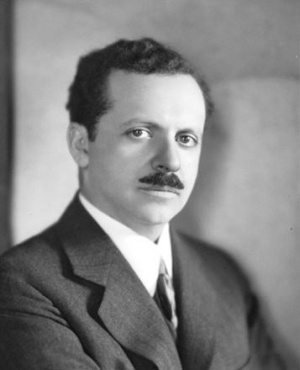Difference between revisions of "Edward Bernays"
(Added: employment, constitutes, birth_name, death_date.) |
m (add quote) |
||
| Line 17: | Line 17: | ||
He felt this manipulation was necessary in society, which he regarded as irrational and dangerous as a result of the ''"herd instinct"'' that Trotter had described.<ref>Trotter (1919).</ref> [[Adam Curtis]]'s award-winning 2002 documentary for the BBC, ''[[The Century of the Self]]'', pinpoints Bernays as the originator of modern public relations, and Bernays was named one of the 100 most influential Americans of the 20th century by ''Life'' magazine.<ref>{{cite book|author=Ewen, Stuart|chapter=Chapter 1: Visiting Edward Bernays|title=PR! A Social History Of Spin -Chapter 1 |publisher=Basic Books|year=1996|url=http://www.bway.net/~drstu/chapter.html}}</ref> | He felt this manipulation was necessary in society, which he regarded as irrational and dangerous as a result of the ''"herd instinct"'' that Trotter had described.<ref>Trotter (1919).</ref> [[Adam Curtis]]'s award-winning 2002 documentary for the BBC, ''[[The Century of the Self]]'', pinpoints Bernays as the originator of modern public relations, and Bernays was named one of the 100 most influential Americans of the 20th century by ''Life'' magazine.<ref>{{cite book|author=Ewen, Stuart|chapter=Chapter 1: Visiting Edward Bernays|title=PR! A Social History Of Spin -Chapter 1 |publisher=Basic Books|year=1996|url=http://www.bway.net/~drstu/chapter.html}}</ref> | ||
| + | |||
| + | From his 1928 book ''[[:File:Propaganda.pdf|Propaganda]]: | ||
| + | {{QB|"The conscious and intelligent manipulation of the organized habits and opinions of the masses is an important element in democratic society," | ||
| + | |||
| + | "Those who manipulate this unseen mechanism of society constitute an invisible government which is the true ruling power of our country. . . . In almost every act of our daily lives, whether in the sphere of politics or business, in our social conduct or our ethical thinking, we are dominated by the relatively small number of persons . . . who understand the mental processes and social patterns of the masses. It is they who pull the wires which control the public mind." | ||
| + | <ref>[https://en.wikipedia.org/wiki/Propaganda_%28book%29 Propaganda (book)] - Wikipadia</ref> | ||
| + | }} | ||
{{SMWDocs}} | {{SMWDocs}} | ||
==References== | ==References== | ||
Revision as of 11:17, 24 December 2015
(Public relations, advertising) | |
|---|---|
 | |
| Born | Edward Louis Bernays 1891/11/22 Vienna, Austria-Hungary |
| Died | 1995-03-09 (Age 103) Cambridge, Massachusetts, USA |
| Nationality | American |
| Religion | Jew |
| Interests | • Propaganda • Public relations • Advertising |
Nephew of Sigmund Freud and considered the father of 20th century propaganda techniques | |
Edward Louis James Bernays (22 November 1891 − 9 March 1995) was an Austrian-American pioneer in the field of public relations and propaganda, referred to in his obituary as "the father of public relations".[1] He combined the ideas of Gustave Le Bon and Wilfred Trotter on crowd psychology with the psychoanalytical ideas of his uncle, Sigmund Freud.
He felt this manipulation was necessary in society, which he regarded as irrational and dangerous as a result of the "herd instinct" that Trotter had described.[2] Adam Curtis's award-winning 2002 documentary for the BBC, The Century of the Self, pinpoints Bernays as the originator of modern public relations, and Bernays was named one of the 100 most influential Americans of the 20th century by Life magazine.[3]
From his 1928 book Propaganda:
"The conscious and intelligent manipulation of the organized habits and opinions of the masses is an important element in democratic society,"
"Those who manipulate this unseen mechanism of society constitute an invisible government which is the true ruling power of our country. . . . In almost every act of our daily lives, whether in the sphere of politics or business, in our social conduct or our ethical thinking, we are dominated by the relatively small number of persons . . . who understand the mental processes and social patterns of the masses. It is they who pull the wires which control the public mind." [4]
A Document by Edward Bernays
| Title | Document type | Publication date | Subject(s) | Description |
|---|---|---|---|---|
| File:Propaganda.pdf | book | 1928 | Propaganda Public relations Advertising | A seminal work on the systematic manipulation of public opinion. |
A Quote by Edward Bernays
| Page | Quote | Date |
|---|---|---|
| Document:The Secret Society That Rules The World | “The conscious and intelligent manipulation of the organised habits and opinions of the masses is an important element in democratic society. Those who manipulate this unseen mechanism of society constitute an invisible government which is the true ruling power of our country. We are governed, our minds are moulded, our tastes formed, our ideas suggested, largely by men we have never heard of.”” | 1928 |
References
- ↑
{{URL|example.com|optional display text}} - ↑ Trotter (1919).
- ↑ Ewen, Stuart (1996). "Chapter 1: Visiting Edward Bernays". PR! A Social History Of Spin -Chapter 1. Basic Books.Page Module:Citation/CS1/styles.css must have content model "Sanitized CSS" for TemplateStyles (current model is "Scribunto").
- ↑ Propaganda (book) - Wikipadia
Wikipedia is not affiliated with Wikispooks. Original page source here